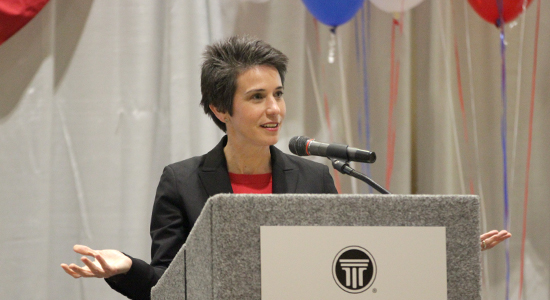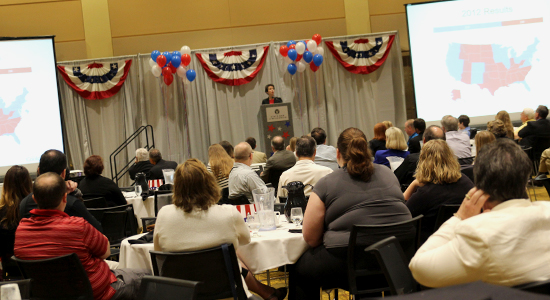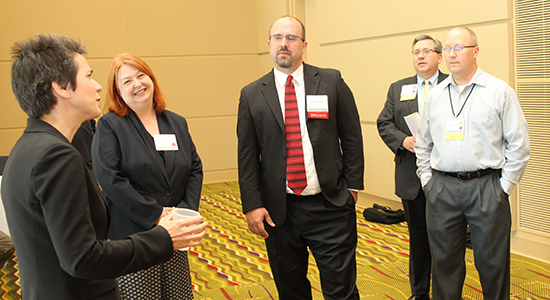
Amy Walter, national editor for The Cook Political Report and former political director at ABC News, closed out the State Bar’s Annual Meeting and Conference with an insider’s look at the state of politics in America.
June 20, 2016 – If you were looking for answers on what’s happening in the current race for U.S. President, Amy Walter certainly provided some to close out the State Bar of Wisconsin’s Annual Meeting and Conference in Green Bay last Friday.
Walter, national editor for The Cook Political Report and former political director at ABC News, says this presidential race is mind-boggling but not unexpected, given the political storm that has been brewing over the course of 30 years.
She noted that both presumptive nominees, Donald Trump (R) and Hillary Clinton (D), are the most unpopular nominees in modern times. The most recent Marquette Law School Poll found that 42 percent of Wisconsin registered voters support Clinton and 35 percent support Trump, with 17 percent saying they will not vote for either one.
At the same time, candidates like Trump and Bernie Sanders (D) illustrate the sharp political polarization among Americans and their distaste for American institutions.
“The more time I’ve looked at this, the more I realized that this was not such a random occurrence,” said Walter, a regular on the political TV news shows. “What’s surprising about this election is not that it happened, but that it took this long for it to happen.”
How Did We Get Here?
For one, we’ve had major disruptive forces pushing at us for the last 20 or 30 years. “I don’t know of any time in American history where you have these disruptions on an economic, technological, social, cultural, and demographic level.”
From globalization to same-sex marriage, these issues have come upon us relatively quickly with incredible impact, Walter said, leaving many people very unsettled.
“There used to be these guideposts,” she said. “They would tell you where we were going and if you were headed in the right direction. Those are gone now, and there’s a helplessness and a feeling of anxiousness and frustration that goes along with that.”
In addition, we have not fully recovered from the 2008 recession, Walter said. “The recovery has not matched the disaster.” Walter said we’ve seen a hollowing out of the middle class for some time.
<iframe src="//www.youtube.com/embed/fincUA5Nylc?rel=0&autohide=1" width="500" height="281" frameborder="0" allowfullscreen></iframe>
Amy Walter discusses the state of U.S. politics with State Bar legal writer Joe Forward.
“If you are an American without a college degree, you’ve seen your weekly average earnings decline by 9 percent the last 40 years. If you have a college degree, you have seen your earnings increase by 22 percent,” Walter said.
“For the first time, a majority of Americans don’t believe their kids will have the same opportunities that they do,” she noted.
At the same time, there is a sense that the institutions that are supposed to help us navigate these tectonic shifts are unable, unwilling, or incapable of helping.
“We distrust institutions now more so than at any point in the last 30 or 40 years,” she said. “The confidence level in Washington and politicians has always been bad, but now it’s even worse. But we have also lost confidence in things like organized religion, and the police for obvious reasons. When you talk to millennials, now the biggest generation in America, they don’t have confidence in any institution, except the military.”
And that makes sense, Walter says. People born between 1980 and early 2000 have seen 9/11 and corporate, church, and major league sports scandals. “It should not be surprising that they don’t believe institutions are there to take care of them,” she said.
So when you have candidates like Trump and Bernie Sanders railing against corporate or government institutions, pretty much any institution, we should understand why it is getting the traction that it does. They are highlighting the failings of institutions.
Research also shows that America has become increasingly polarized in the last 40 years. Thirty years ago, most members of Congress were clustered in the middle.
“Like continents that are moving away from each other, the reds have gone over there and the blues are over there,” she said. “There is nothing left in the middle. People ask why Congress can’t compromise. There is nobody left to compromise with.”
When you look at the actual issues, the actual policies, Walter said there are more on which the parties agree than disagree. “It’s just that we simply don’t like each other. We are saying: ‘I don’t disagree with you. I just hate you.’”

Amy Walter examines the electoral map.
“If I tell you I’m from Madison, it’s very different than if I tell you I’m from Appleton,” Walter said. “We are watching people literally move to places that conform to their own social, cultural, political ideology. We are using our feet to make a statement.”
And we are using our digital devices to insulate ourselves from differing points of view. That is, we generally interact with like-minded people and information.
“This is the environment in which this election is happening,” Walter said. “So are we that surprised that the people who have risen to the top look like Donald Trump or Bernie Sanders? Not at all. They are polarized figures on both ends.”
What About Trump Versus Clinton?
Trump and Clinton are officially the most unpopular people in modern times to be nominated for U.S. President. “We have a general election now between the most outsider, disruptive candidate we have ever seen and the most establishment, status quo insider we could possibly pick,” said Walter of Trump and Clinton.
Before this election, Bill Clinton was the most unfavorable Democratic candidate in modern times at minus-11 heading into the summer before the 1992 election, based on national polling. Hillary Clinton is at minus-17. On the Republican side, Mitt Romney’s unfavorable rating was at minus-3 in 2008. A recent poll puts Trump at minus-41.
“How do you make sense of an environment in which more people are saying that their vote for President won’t be for who they like, but who they dislike least?” Walter asked.
The election will come down to messaging and math, Walter said. In every election at every level, voters generally have two options: change or status quo.
“This is the kind of year, based on what we saw in the primaries, based on what we see overall, that suggests this is a time for a change campaign. People are frustrated, they want to see movement, they want to see the status quo disrupted,” Walter said.

Amy Walter speaks to a group of members prior to her closing plenary.
Trump is the change candidate. But Clinton’s message is that changes under Trump will be devastating for America. Then there’s math. A candidate needs 270 electoral votes.
Since 1992, Republicans have carried the same 13 states in every election, Walter noted. Democrats have carried 18 states, including Wisconsin. So Democrats have historically started with 90 percent of the electoral votes needed to win.
After the 2012 election, the Republican Party developed a strategy to surmount the “Blue Wall” of states that repeatedly voted for Democrats, despite winning at the state level. Republicans control in Wisconsin, for instance, but Obama won Wisconsin.
That strategy involved greater outreach demographically beyond older white voters, who hold a decreasing share of the American electorate (electorate 88 percent white during Ronald Reagan years; 72 percent white in the 2012 election).
But Walter noted that Trump’s unfavorability rating among non-white voters is 88 percent; 75 percent among the youth vote, 77 percent unfavorability among women.
“Everything Republicans said they needed to do, they did not do,” Walter said. “They put up a candidate who actually did the opposite of that.”
At the same time, Clinton has challenges. “She’s not polling as well as Barack Obama did among younger voters. Bernie Sanders proved there is a generational divide in the Democratic Party, and she has to find a way to get them back,” Walter said.
 Joe Forward, Saint Louis Univ. School of Law 2010, is a legal writer for the State Bar of Wisconsin, Madison. He can be reached by email or by phone at (608) 250-6161.
Joe Forward, Saint Louis Univ. School of Law 2010, is a legal writer for the State Bar of Wisconsin, Madison. He can be reached by email or by phone at (608) 250-6161.
If the electoral maps remained the same as 2012, however, Clinton would only need to win Florida. Trump would need to win Florida, Ohio, Pennsylvania, and North Carolina. Walter noted that we can’t assume the 2012 maps will hold true in 2016.
“But if your strategy is to just run up the score among white men without college degrees, there’s a shrinking universe of people to turn out,” Walter said.
At the end of the day, she said, we are going to see another negative election on the airwaves, more evidence that Americans are sharply divided in more ways than one.
“I think we are going to have a country that is more polarized among race and gender, and class and education levels than we have seen at any point in modern times,” she said. “We are also going to end up with a President the majority say they don’t like.”
Are there any positives that can come from a seemingly depressing period in American politics? “We are just in a challenging and disruptive time,” she said. “Disruptive periods feel uncomfortable. But we are handling it the right way. We don’t have military coups. We aren’t seeing people at Whole Foods suddenly invading the people at Walmart.”
“We have to appreciate where we are. If we are going to make it better ourselves, we need to try and understand the ways in which we are insulated and isolated from each other. When that starts to change, our politics will start to change,” Walter said.
